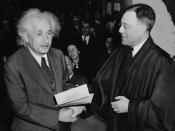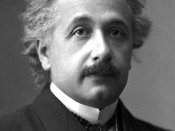Over the years scientists have been known to assist their respective countries during wartime by formulating methods to give their nation unduly advantages over their foes. However the issue of whether it is their "duty" to do so has been met with thought provoking discussions.
Fritz Haber, born in 1868 and bred in Breslau, Germany, was a scientist who lived for science, both for its own sake and also for the influence it has in molding human life and human culture and civilization. The method of creating Ammonia which was extremely rare at the time, was invented by this very scientist, thus the process is named "Haber Process" after him. He devised a way of using high pressure (approximately 3000 pounds per square inch) and high temperature (about 500 degrees Celsius) with iron acting as a catalyst to combine nitrogen and hydrogen in their gaseous forms to produce Ammonia.
He also designed the first gas bombs and proceeded to command the first regiment to ever use them.
Haber was a scientist who felt obligated to aid his nation, Germany, in whatever way he could and he did so enthusiastically during the WWI. He felt that it was the duty of every member of the nation to contribute to its war efforts, causing one to assume that he was a patriot. The celebrated German scientist was perfect specimen of individuals who felt that it was their duty to help their country during wartime. In my opinion patriotism is a good attribute to posses.
Although I think that scientists should assist their country during war, moral values and ethical codes should also come into question because it should be taken into consideration that in helping the country the scientist could also unconsciously sentencing innocent civilians to their doom. This was the...


